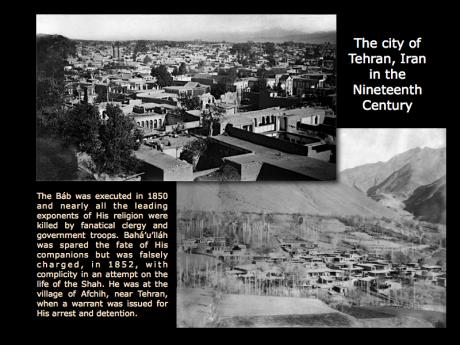
The Story of Baha’u’llah’s Arrest in 1852
Part 1
“Give me a chance to fling my stone in His face!”
After the Bab declared that He was the promised Qaim, in 1844 “realizing that their own privileges were endangered, they persuaded Nasiri’d-Din Shah that the Bab was a threat to the state.
Although the Bab had shown every respect for civil authority, the Shah chose the side of his advisers. A campaign of terror was launched. Thousands of the Bab’s followers were hounded throughout the country, betrayed, tortured, and massacred. Finally, on July 9, 1850, the Bab was executed.”
One of the Bab’s leading supporters was a young nobleman named by the Bab “Baha’u’llah.” Because of the prominence of His family and the respect which his own life had won him at the Persian Court, Baha’u’llah was not killed in the general massacres. His leadership of the persecuted “Bab’is,” however, made him a marked man. Highly placed opponents of the Bab appeared determined to put him to death. There was, however, no believable pretext on which so prominent a personality could be could be condemned. Baha’u’llah was widely admired.
The pretext came in 1853 when two youths fired a shot at the king as he emerged on horseback from his palace. Immediately the responsibility was placed on all the followers of the Bab and Baha’u’llah. Implacable hostility swept the nation. All attempts to inquire into what had really happened were cast aside.
Nasiri’d-Din Shah, his ministers, the clergy, and the people united in relentless hate, delighted to have at last an excuse for annihilating one whom they had come to fear as a danger to the state.
Many who were merely thought to be friendly or sympathetic to the new faith were arrested and slain, unless they were wealthy and could fill the coffers of their persecutors. In Baha’u’llah’s case, the authorities knew that the sentence of death and his execution must be done with cunning. Baha’u’llah and his family were still highly respected in the land. Baha’u’llah’s father had been a leading nobleman, a highly esteemed and honored minister of state.
During those hectic days when one of the waves of persecution reached its peak, Baha’u’llah was a guest of the new Prime Minister, Mirza Aqa Khan. He, should have been safe there. This same Prime Minister was understood to have promised the Bab that he would protect the innocent victims of the king’s wrath if the Bab would help the minister. The Bab had done so. Now the new Prime Minister, Mirza Aqa Khan, faced the crisis of having to redeem that pledge.
No one knew better than the Prime Minister that Baha’u’llah was innocent of any crime. Unhappily for the soul of this troubled minister, his loyalties constantly fluctuated back and forth throughout his career. One moment he would be inspired to try and help the mistreated followers of the Bab, the next he would cringe in fear, dreading the loss of his position. He would then begin attacking them. In the end, fear pushed out courage and decency. It also precipitated the downfall and disgrace of the Prime Minister. At first, Mirza Aqa Khan tried to effect a reconciliation between the Shah and Baha’u’llah. He sent a warm letter to Baha’u’llah in Karbila, Iraq, where Baha’u’llah had been exiled briefly by the previous Prime Minister, telling him of these plans and inviting Baha’u’llah to return to the capital. For a month he was the honored guest of Mirza Aqa Khan. During this time a great number of notables and dignitaries from Teheran flocked to meet Baha’u’llah. So much attention and honor was paid to him that it aroused the envy and fury of his enemies.
Baha’u’llah was a guest in the village of Afchih when news came of the attempt made on the life of the Shah. He condemned the act in the strongest terms, but he also refused to listen to the pleadings of the Prime Minister’s brother who urged him to flee into hiding in the neighborhood. Instead, Baha’u’llah set out on foot for the Shah’s residence, and the headquarters of the Imperial Army in Niyavaran to prove his innocence. He refused even the offer of an armed escort.
When Baha’u’llah reached the village of Zarghandih he was met and conducted to the home of the Secretary of the Russian Minister, Prince Dolgorukov. The news of Baha’u’llah’s arrival was conveyed at once to Nasiri’d-Din Shah. The king was greatly amazed at Baha’u’llah’s boldness in coming directly to his encampment. Prince Dolgorukov proposed to the Prime Minister, Mirza Aqa Khan, that he protect Baha’u’llah in his own residence from the enemies who sought his destruction. The Prime Minister was afraid to extend any further consideration to Baha’u’llah for fear he might permanently lose his own position and prestige. Baha’u’llah was, therefore, delivered into the hands of a group of his enemies among the military.
They stripped him of his headgear. Barefoot and bareheaded, and in chains, Baha’u’llah was marched the full distance from Shimiran to Teheran under the blazing sun. Several times along the way, his outer garments were torn from his body by the soldiers and the mob. He was struck by the officers accompanying him, overwhelmed with abuse and ridicule, and pelted with stones and refuse.
As Baha’u’llah was approaching the capital, a fanatical old woman rushed from the crowd with a stone in her hand. Her whole frame shook with rage as she raised the stone, but the procession was moving too rapidly for her to keep pace. She tried to them, shouting, “I entreat you! Give me a chance to fling my stone in his face!” Baha’u’llah saw her hastening after him. He halted the guard long enough to give the old lady her chance, saying:
“Deny her not what she regards as a meritorious act in the sight of God.”
From Prisoner and the Kings, by William Sears.






